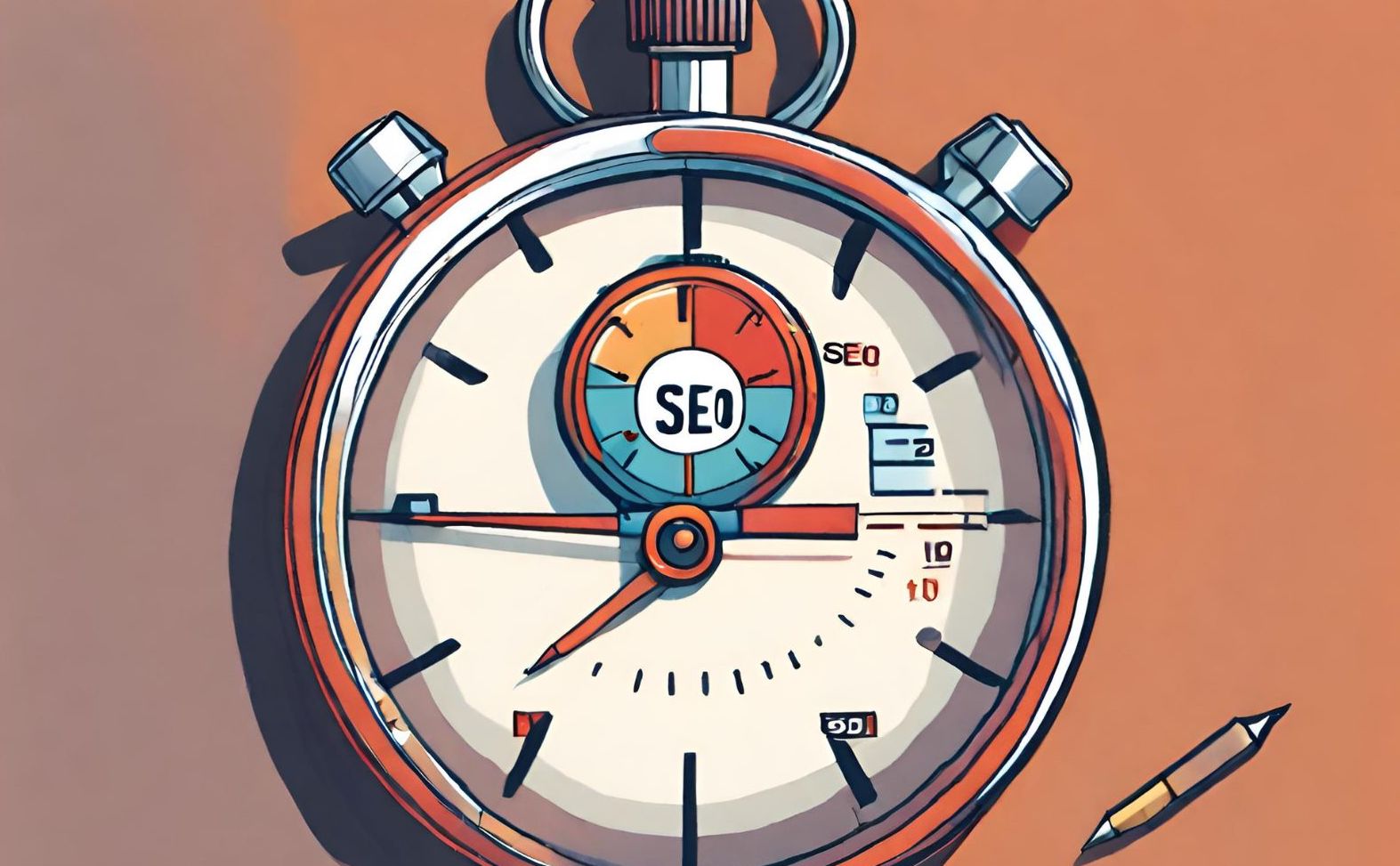SEO Timing: How Long Does SEO Take?
SEO takes time and patience to see results.
Many factors influence how quickly your efforts will improve search rankings, including your site’s current state, niche competitiveness, keywords targeted, and strategies used. Expect SEO to take 3-12 months to significantly boost rankings.

Search engine optimization (SEO) is like baking a cake from scratch.
You need to carefully gather the ingredients, mix them in the right proportions, and bake at just the right temperature.
Rushing any part of the process could lead to a burnt, undercooked, or just plain bad tasting cake.
The same goes for SEO. It takes time and patience to see results. Many business owners and marketers want their site to rank #1 for their target keywords overnight. But that’s not how it works. SEO is an ongoing process that requires commitment over months and even years.
In this post, I’ll explain why SEO takes time, break down the key factors that influence SEO timing, and give you a realistic timeline so you know what to expect.
Why SEO Takes Time
There are two core reasons why SEO takes significant time to yield results:
First, search engines like Google want to provide the most relevant, high-quality results to searchers. They don’t make changes to their ranking algorithms lightly. Google carefully tests algorithm updates before rolling them out to make sure they improve search quality.
Second, Google wants to prevent spam and manipulation. If sites could easily and instantly jump to #1 in rankings, bad actors would take advantage. Google’s slow, steady approach to updating rankings makes large-scale manipulation more difficult.
So Google has good reasons to take a measured, careful approach to SEO. But for those doing the optimization, it means having patience. Rankings shift gradually as search engines observe signals like content quality, user engagement, and trust over time.
Key Factors That Influence SEO Timing
Several key factors impact how quickly your SEO efforts will move the needle on rankings:
1. Your Site’s Current State
- A brand new site with thin content will take longer to rank than an established site with abundant, high-quality content.
- A site riddled with technical problems will require more time to fix foundational issues before focusing on SEO.
- An outdated site with few backlinks needs more work to catch up to competitors.
2. The Competitiveness of Your Niche
- SEO for low competition keywords in relatively small niches can yield quicker wins.
- High traffic keywords in hot niches like health, finance, and law will likely take longer to move up in rankings.
3. The Types of Keywords Targeted
- Ranking for short “head” keywords usually happens faster than long-tail, multi-word keyword phrases.
- Local SEO rankings for geographic keywords move faster than national or global keywords.
- Transactional keywords around buying intent bring faster results than informational keywords.
4. The SEO Strategies Used
- Quick wins come from fixing technical issues like site speed, broken links, etc.
- Building high-quality content, backlinks and citations takes more time.
- Leveraging schema markup and optimizing for voice search provide gradual boosts.
- Constantly tracking and testing your SEO efforts.
As you can see, the timeline depends on where you’re starting from and how competitive your niche is.
But across industries, a good rule of thumb is to expect SEO to take between 3 to 12 months to significantly improve rankings.
An SEO Timeline Overview
While the exact timing will vary, here is a general timeline for what to expect with your SEO efforts:
| Months | SEO Activities | Expected Results |
|---|---|---|
| 1-3 | - Technical SEO audit and fixes - Basic on-page optimization - Initial content creation - Begin link building outreach |
- Improved site crawlability - Minor ranking increases for easy keywords |
| 4-6 | - Expand content for more keywords - Diversify backlink profile - Implement schema markup - Research competitors' strategies |
- Gradual rankings improvement - More search visibility |
| 7-9 | - Ongoing content production - Influencer outreach - Fix Search Console issues - Grow social media |
- Keywords moving up in rankings - Increased organic traffic |
| 10-12 | - Create pillar content - Build thought leadership - Mobile optimization - Earn links from authority sites |
- Ranking gains accelerate - Established authority in niche - Outranking competitors |
After a year of concerted effort, your site should have improved visibility and authority. With sustained effort, your site can outrank competitors.
SEO Is a Long Game
I know it’s not what you want to hear, but SEO simply takes significant time. But it’s worth playing the long game. With a steady, persistent effort, your site will slowly but surely gain visibility and traffic.
Rome wasn’t built in a day, and high search engine rankings don’t happen overnight either. But with a solid SEO strategy and commitment to execution, you can outperform competitors in your niche.
Set realistic expectations, stay patient, and keep optimizing. Your search rankings will gradually improve over months and years. And like compound interest, those results build on themselves for increasingly higher returns.
So take a deep breath, roll up your sleeves, and get ready to play the long SEO game. Your future visitors are searching right now. And they’re waiting to find your amazing website – once search engines know how amazing it is.
Read Next
How To Geotag Photos For SEO: A Comprehensive Guide
Boost local SEO by learning how to geotag photos effectively, enhancing visibility and driving targeted traffic to your site with our guide.
What is Local SEO?
Learn what local SEO is, why it’s vital for local businesses, and get 5 tips to improve your local SEO to get found by your customers.
The SEO Game Has Changed: SEO vs. GEO
Discover the key differences between generative engine optimization (GEO) and search engine optimization (SEO) in our latest guide.



